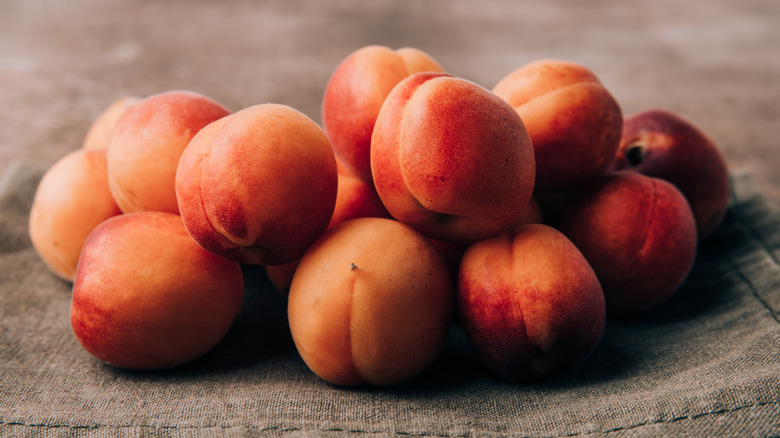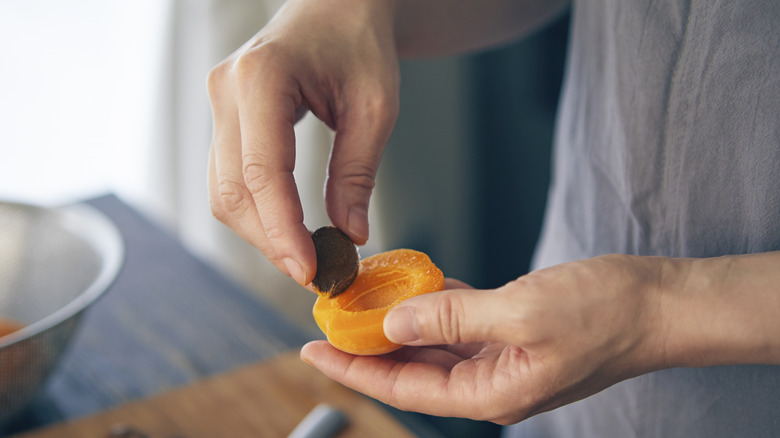The Underrated Stone Fruit That Can Help You Poop Fast (And Lower Bad Cholesterol)
If you've been indulging in too much processed food or experimenting with the carnivore diet, your gut might be feeling the effects of a low-fiber diet. Fiber is essential for keeping things moving smoothly in your digestive system. It adds bulk to your stool, making it easier to pass. Plus, certain types of fiber can slow down digestion and even help lower your cholesterol.
Most people need between 25 and 30 grams of fiber a day, and it's best to get your fiber through foods rather than fiber supplements. Sure, you can stock up on high-fiber fruits like blackberries, raspberries, and blueberries, but you can also include stone fruits like apricots in your grocery cart.
A cup of apricot halves gives you 3 grams of fiber in just 74 calories. Just be sure to eat the skin of the apricot to ensure you're getting the fiber. Apricots are also a good source of potassium, vitamin C, vitamin E, and vitamin A as beta-carotene. Eating more whole fruits like apricots can give your digestive system a boost while helping to improve your cholesterol.
How apricots help you poop and reduce cholesterol
Apricots have both soluble and insoluble fiber to keep your digestive system humming. Not only does insoluble fiber add bulk to your stool, but it also stimulates activity in your gut. Soluble fiber mixes with water to soften your poop. Fiber without water can cause constipation, but apricots are 86% water.
Prunes and prune juice are often researched for their ability to help people poop, but remember that prunes are dried plums. Like plums, apricots are part of the stone fruit class. According to a 2021 study in Food and Function, the fiber and sorbitol in apricots might work together to improve your gut microbiome and bowel output. Sorbitol is a sugar alcohol naturally found in fruit, but it's also sold as a laxative.
The soluble fiber in apricots plays a key role in managing cholesterol levels. It binds to cholesterol in your intestines, preventing it from being absorbed into your bloodstream. The fiber carries the cholesterol through your digestive system and helps eliminate it from your body. According to the National Lipid Association, adding 5 to 10 grams of soluble fiber to your diet a day can reduce your LDL cholesterol by up to 11 points. However, don't rely on dried apricots to lower your cholesterol. A 2020 study in the British Journal of Nutrition found that eating ¾ cup of dried fruit a day for four weeks raised LDL cholesterol in older adults.
Other health benefits of apricots
Apricots don't just help your digestive system and cholesterol levels. The phenolic compounds found in apricots protect your heart by helping your body fight off free radicals, according to a 2022 review in Molecules. These antioxidants also help your body defend itself from chronic issues such as gastritis, liver disease, and atherosclerosis. The plant-based compounds in apricots also reduce inflammation that often leads to disease.
Most people enjoy the fleshy fruit of an apricot, but there's something more nutritious hidden in the pit of the apricot. If you crack it open, there's a small seed inside. According to a 2022 review in Foods, apricot kernels have caffeic and gallic acids that neutralize free radicals and protect your cells from oxidative stress. These kernels can also improve blood flow by enhancing the functioning of your platelets. The flavonoids and flavones in apricot kernels can prevent excess blood clotting that can lead to cardiovascular disease. A key compound in apricot kernels is amygdalin, which releases hydrocyanic acids to kill cancer cells. However, too much amygdalin can be toxic to the body.


